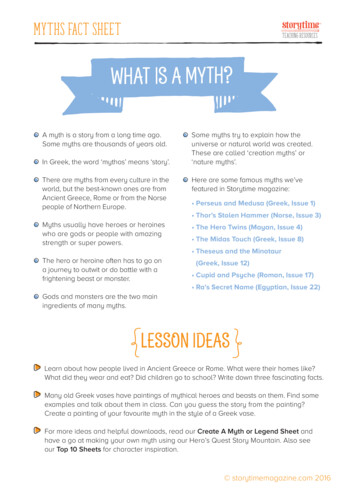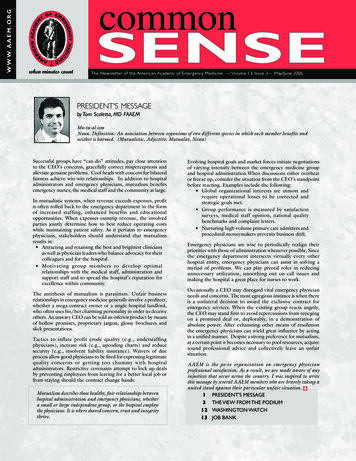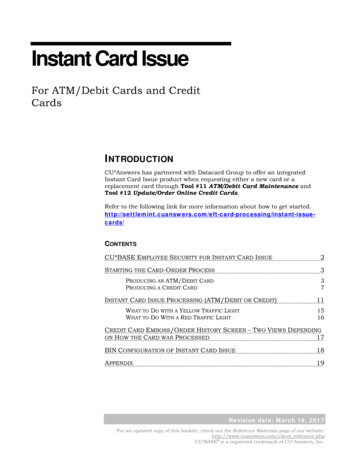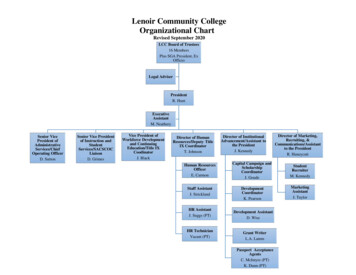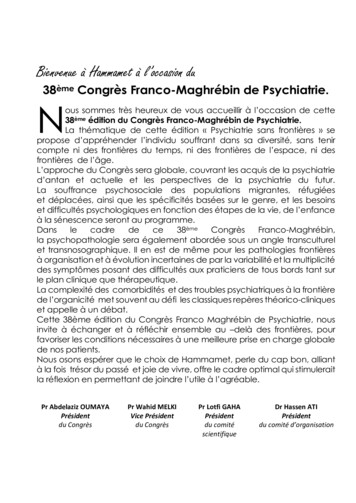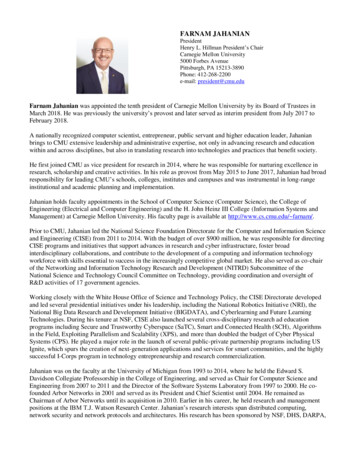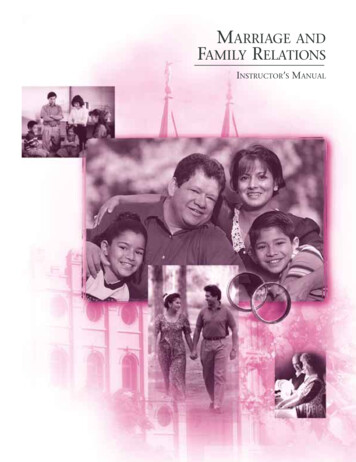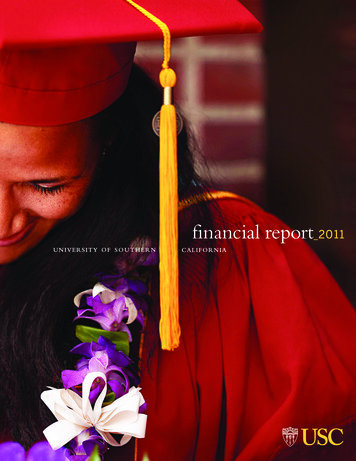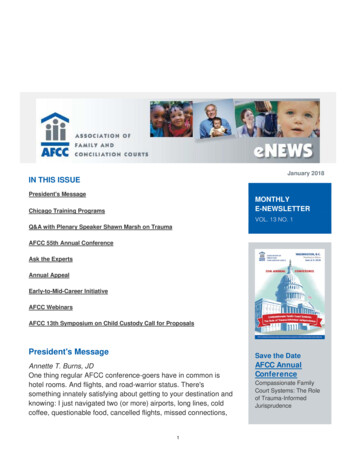
Transcription
Corinne BennettFrom:Sent:To:Subject:Association of Family and Conciliation Courts afcc@afccnet.org Wednesday, January 24, 2018 5:00 AMCorinne BennettJanuary 2018 President's Message Ask the Experts 55th Annual ConferenceJanuary 2018IN THIS ISSUEPresident's MessageMONTHLYE-NEWSLETTERChicago Training ProgramsVOL. 13 NO. 1Q&A with Plenary Speaker Shawn Marsh on TraumaAFCC 55th Annual ConferenceAsk the ExpertsAnnual AppealEarly-to-Mid-Career InitiativeAFCC WebinarsAFCC 13th Symposium on Child Custody Call for ProposalsPresident's MessageSave the DateAnnette T. Burns, JDOne thing regular AFCC conference-goers have in common ishotel rooms. And flights, and road-warrior status. There'ssomething innately satisfying about getting to your destination andknowing: I just navigated two (or more) airports, long lines, coldcoffee, questionable food, cancelled flights, missed connections,1AFCC AnnualConferenceCompassionate FamilyCourt Systems: The Roleof Trauma-InformedJurisprudence
uncomfortable seats, smelly cabs, drafty hallways, and sore feet,and once again, I survived.Read moreRegister Today for Chicago Training ProgramsRegister now for AFCC's March training programs, in collaborationwith Loyola University Chicago School of Law Civitas ChildLawCenter. Each program is eligible for up to 12 hours of continuingeducation. View the brochureJune 6-9, 2018Washington HiltonWashington, DCAFCC ChapterConferencesArizona Chapter AnnualConferenceJanuary 26-28, 2018Hilton Sedona ResortSedona, ArizonaBuilding a Successful Unbundled Family Law PracticeForrest "Woody" Mosten, JDMarch 5-6, 2018Louisiana ChapterAnnual ConferenceJanuary 26-27, 2018Paul Hebert Law CenterBaton Rouge, LouisianaParenting Coordination: Work in the Trenches with HighConflict CoparentsMatthew J. Sullivan, PhDMarch 7-8, 2018California ChapterAnnual ConferenceFebruary 2-4, 2018Park Central HotelSan Francisco, CaliforniaMore InformationUntangling the Trauma from the Drama: Q & A withDr. Shawn MarshDr. Shawn C. Marsh, Director of Judicial Studies and AssociateProfessor at the University of Nevada, Reno, will present a keynoteaddress, "Towards a Trauma-Responsive System of Justice: UntanglingTrauma from Drama", at the AFCC 55th Annual Conference,Compassionate Family Court Systems: The Role of Trauma-InformedJurisprudence in Washington, D.C. June 8, 2018. He is also the firstauthor of "Preparing for a Trauma Consultation in Your Juvenile andFamily Court", produced by the National Council of Juvenile and FamilyCourt Judges (NCJFCJ) and the Office of Juvenile Justice andDelinquency Prevention (OJJDP) and was gracious enough to allow usto catch up with him to ask a few questions.Washington ChapterAnnual ConferenceFebruary 3, 2018University of WashingtonSeattle Tower OSeattle, WashingtonAlberta Chapter AnnualConferenceMarch 15-16, 2018Matrix HotelEdmonton, AlbertaMissouri ChapterAnnual ConferenceMarch 15-16, 2018Marriott St. Louis WestSt. Louis, MissouriOregon Chapter AnnualConferenceApril 13, 2018River's Edge HotelPortland, OregonRead moreAFCC 55th Annual Conference2
Compassionate Family Court Systems: The Role of TraumaInformed JurisprudenceJune 6-9, 2018, Washington Hilton HotelThe AFCC 55th Annual Conference program brochure is nowavailable online and registration is open! Start making your plansto attend.Book your hotel room, check out the conference brochure, viewthe scholarship application and more!Register todayFlorida Chapter AnnualConferenceSeptember 26-28, 2018The Florida Hotel andConference CenterOrlando, FloridaWisconsin ChapterAnnual ConferenceSeptember 28, 2018AFCC MarchTraining ProgramsThank you to our Diamond and Platinum Sponsors. To see acomplete list of sponsors, click here.Building a SuccessfulUnbundled Family LawPracticeMarch 5-6, 2018Loyola University ChicagoPhilip H. Corboy LawCenterChicago, IllinoisExhibit and Advertising Opportunities AvailableExhibiting and advertising at the Annual Conference are greatways to share your products and services with an interdisciplinarycommunity of dedicated family law professionals. Exhibit space islimited and beginning to fill up—ensure your space by committingtoday. For more information, click here or contact Corinne Bennett.Parenting Coordination:Work in the Trenches withHigh Conflict Co-parentsMarch 7-8, 2018Loyola University ChicagoPhilip H. Corboy LawCenterChicago, IllinoisDonate to the Silent AuctionThe annual AFCC Silent Auction is a longstanding AFCC tradition.All proceeds support AFCC special projects and initiatives. Donatean item and attend the auction to bid! You do not need to attendthe conference to donate. Past auction items include tropicalgetaways, one-of-a-kind jewelry, sports memorabilia, the latestgadgets and electronics, books, and more. Donate an item.EDITOR:Leslye HunterASSOCIATE EDITOR:Corinne BennettApply for a Conference ScholarshipAFCC is offering more than 30 conference scholarships whichinclude a pre-conference institute registration, a full conferenceregistration, and a certificate of attendance. In addition, a limitednumber of 500 and 1,000 travel stipends are available to someapplicants with high travel costs, international applicants, andthose who demonstrate a financial need. The deadline to apply for3afccnet.org
a scholarship is March 9, 2018. Recipients will be notified mid-tolate March.Apply nowAsk the Experts: Ten Tips to Reducing StressLeslie Todd, LCSW, ACSWIt is widely acknowledged that family law issues can be extremelystressful for the parties involved. The family law professionals whoare engaged in these cases can experience significant stress, aswell. Here are some suggestions for professionals to help themmanage that stress.Read moreDonate to the AFCC Scholarship FundHelp your colleagues attend AFCC conferences by giving to the AFCC Scholarship Fund. AFCCscholarship recipients increase our diversity by bringing professionals from differentbackgrounds, representing the many disciplines we represent as an organization. The annualappeal letter was recently mailed to all AFCC members. Will you contribute to allow a hardworking professional like yourself attend an AFCC conference?Donate TodayEarly-to-Mid-Career InitiativeHave you heard about AFCC's Early-to-mid-career (E2M) initiative? Last year's fellows KristinDoeberl and Liana Shelby formed the networking group prior to the 54th Annual Conference inBoston. Since the conference, current fellows Robin Timme and Daniel Nau (with the help ofLiana and Kristin) have picked up the baton and have made progress on the E2M group. Wecurrently have a E2M Facebook group, a monthly newsletter, a webinar series, and upcomingevents at the 55th Annual Conference. If you would like to be added to the mailing list, pleaseemail Corinne Bennett, AFCC Program Coordinator.Read more about E2M4
AFCC Webinar CornerRegister now for next month's webinar:New Research on LGBTQ ParentingTodd Brower, JD, LLMFebruary 13, 2018 1:00pm EasternRegister nowIf you missed this month's webinar, Potential Impact of Implicit and Cognitive Bias, membersmay access the recording for free through the Member Center of the AFCC website.Introducing AFCC E2M Webinar Series!Join AFCC E2M (early-to-mid career professionals) webinar:Work/Life BalanceAnnette T. Burns, JDMarch 7, 2018 1:00-2:00pm Eastern TimeRegistration is now open!This webinar is geared towards the E2M crowd and is free to AFCC members. Please register toparticipate!AFCC Award NominationsAFCC awards acknowledge many important contributions made by individuals and organizationsto enhance the lives of children and families involved in family courts. Your nominations helprecognize and bring attention to these accomplishments.Nominations for the following awards, to be presented at the AFCC Annual Conference inWashington, D.C., will be accepted online through March 15, 2018:John E. VanDuzer Distinguished Service Award recognizes outstanding contributions and/orachievements by AFCC members;Stanley Cohen Research Award, sponsored by the Oregon Family Institute, recognizesoutstanding research and/or achievements in the field of family and divorce; andIrwin Cantor Innovative Program Award recognizes innovation in court-connected or courtrelated programs created by AFCC members.Submit a nomination online, see past recipients, learn more about the awards and criteria.AFCC Chapter News5
Meet Debra Weaver, President of theFlorida ChapterMeet Natalie Synder, President of theIndiana ChapterRead moreRead moreMeet Beth Fawver McCormack, President of the Illinois ChapterRead moreAFCC 13th Symposium on Child Custody Call for ProposalsGuidelines and Standards and Rules, Oh My!November 8-10, 2018Denver, ColoradoThe AFCC Conference Committee is seeking proposals for 90-minute workshop sessions. Share yourwork with the interdisciplinary community of family law professionals who attend AFCC conferences.Proposals must be received using the online form by May 7. The program brochure and onlineregistration will be available July 2018.View the call for proposals. Submit online.Family Court Review Seeks Social Science Editor6
Family Court Review (FCR), the quarterly academic and research journal of AFCC, is seeking aSocial Science Editor. AFCC is an interdisciplinary and international association of judges,lawyers, mediators, mental health professionals, social scientists, court administrators,educators and others concerned with promoting constructive methods of family conflictresolution. FCR is an interdisciplinary journal prepared for publication at Hofstra University LawSchool by a student editorial staff, working under the supervision of the FCR FacultyAdministrative Editor. The Social Science Editor will be responsible to and work closely with theFaculty Administrative Editor and the Editor in Chief. He or she will work with the Editorial Boardand student staff of FCR to promote the interdisciplinary mission of FCR and AFCC. Thedeadline for submitting an application is February 28, 2018. If you are interested in a copy of theCall for Applications, please email Peter Salem, AFCC Executive Director, atpsalem@afccnet.org.Association of Family and Conciliation Courts (AFCC)6525 Grand Teton Plaza, Madison, WI 53719(608) 664-3750Unsubscribe7
VOL. 13 NO. 1JANUARY 2018President’s MessageAnnette T. Burns, JDPhoenix, ArizonaOne thing regular AFCC conference-goers have in common is hotel rooms. And flights,and road-warrior status. There's something innately satisfying about getting to yourdestination and knowing: I just navigated two (or more) airports, long lines, cold coffee,questionable food, cancelled flights, missed connections, uncomfortable seats, smellycabs, drafty hallways, and sore feet, and once again, I survived. No wonder the hotellobby bars are usually full of happy travelers celebrating their most recent triumph overtravel. The real reward is, of course, meeting up with colleagues and getting theexceptional information offered in AFCC workshops and plenaries, but sometimes justputting the key card in that hotel room door at the end of a travel day feels like a rewardin itself.We can only imagine how much more travel hassle is involved when it’s travel abroad.AFCC has a vigorous contingent of European, Canadian, Australian, and otherattendees from outside of the United States at every conference. On top of all thechallenging things I’ve already listed about travel, you can add, for our friends fromabroad, dealing with Customs and enhanced security lines, more layovers, languagebarriers, significant time changes, and jet lag. AFCC members gain an incredibleamount of information from our international colleagues and presenters, and we areespecially grateful for their efforts.AFCC is going abroad soon, as Executive Director Peter Salem and I travel first to thenation of Malta, and then to London and Windsor, to meet with many, many friends ofAFCC who are similarly concerned with how best to help families. The InternationalCommission on Couple and Family Relations (ICCFR) is holding a three-dayconference in Malta in February to discuss Couple Relationships in the 21st Century,and AFCC will be there to learn new ways to serve. In London, AFCC will partner withthe Nuffield Foundation to bring together policy makers, the judiciary and practitionersfrom across Europe for a one-day conference to discuss key developments which canimprove the resolution of family law disputes. And at Windsor Castle, AFCC ispartnering with Relate, which is the United Kingdom’s largest provider of relationship
support, in sponsoring a consultation (think tank) to examine Modern Families andModern Family Justice in Europe. We are hoping that this event will result in a reportand additional publications and conference presentations on the state of the art inEuropean family justice systems.At all three of these functions, AFCC will share perspectives on family justice with abroad variety of European policy-makers, practitioners, and others. And while Peter andI expect our share challenges with jet lag, security, customs, layovers, and red-eyes, itseems only fair given the sacrifices our friends from overseas make to get to AFCCconferences on a regular basis.In a short span of ten days in February, AFCC will further broaden its futureinternationally by sharing and cooperating with our European counterparts. We lookforward to learning from them and developing a broader perspective for AFCC’s future.
VOL. 13 NO. 1JANUARY 2018Q & A with AFCC Keynote Speaker Shawn C. MarshDr. Shawn C. Marsh, Director of Judicial Studies and Associate Professor at theUniversity of Nevada, Reno, will present a keynote address, "Towards a TraumaResponsive System of Justice: Untangling Trauma from Drama", at the AFCC 55thAnnual Conference, Compassionate Family Court Systems: The Role of TraumaInformed Jurisprudence in Washington, DC June 8, 2018. He is also the first author of"Preparing for a Trauma Consultation in Your Juvenile and Family Court", produced bythe National Council of Juvenile and Family Court Judges (NCJFCJ) and the Office ofJuvenile Justice and Delinquency Prevention (OJJDP) and was gracious enough toallow us to catch up with him to ask a few questions.Q: Your keynote title is extremely thought-provoking. Can you tell us a little aboutthe differences between trauma and drama, and where toxic stress fits into thisequation? Is the word "trauma" overused?I crafted the title to acknowledge a tension we are seeing in courts and to grab theattention of participants – so I’m glad it seems to be working! For this talk, I’mspecifically interested in exploring the challenge justice professionals face when tryingto appropriately contextualize and respond to behaviors versus behaviors associatedwith traumatic experiences. The trauma-informed movement in the justice system isproviding frameworks and strategies to tackle this challenge, and I do think we areseeing improvements in practice and outcomes as a result. However, I also think anunintended consequence of this movement is the word “trauma” does tend to becomeoverused and often lacks shared meaning across stakeholders. This can be problematicin that words matter: every negative experience is not traumatic; rather, stress tends tooperate on a continuum. Further, not all challenging behaviors are a result of potentiallytraumatic experiences, and not all potentially traumatic experiences result in challengingbehaviors. Helping courts and allied systems untangle the complexities of these issues– i.e., the “trauma from the drama” – remains an important part of the trauma-informedcourt movement.
Q: Is the meaning of trauma changing? Are we seeing different forms orgradations of trauma, perhaps necessitating a redefinition?One should expect that the definition of a term or concept like “trauma” will likely changeover time and with advances in our scientific fund of knowledge. For example, how wethink about traumatic stress reactions in the context of combat is substantially differenttoday than during the Civil War. What I do think will remain relatively consistent is thatthere can be different types and degrees of stress, adversity, trauma, etc. Many peoplefind it helpful to think of stress as operating on a continuum from something like “helpfulto harmful.” Although this is somewhat oversimplified for reasons I hope to cover in mykeynote, I think it does serve as as a useful heuristic on which to base ongoingdialogue. One important component of this dialogue is where, how, and even if to fit adiagnosis such as Posttraumatic Stress Disorder.Q: Are trauma-informed practice and a trauma-responsive system of justicedifferent? How do they work together?I view them as being very similar, and organizations such as the National Centers forChild Traumatic Stress have done wonderful work identifying the elements of what itmeans to be “trauma-informed” at various levels of ecology. I will say some people doprefer the term “responsive” versus “informed” to message a more active versuspassive orientation to the work, but I think the basic tenets of care pretty much remainthe same. From the conceptual framework I tend to use in my work with courts, theseconditions of care and healing include ensuring safety, supporting personal agency, andnurturing pro-social support across the domains of environment, practice, policy, andpersons – for both the consumers and administrators of justice. It also is important toremember that although outcomes of interest are perhaps different across institutions(e.g., hospitals versus courts), each is part of a larger community of healing in whichcoordination is absolutely critical.Q: How does assessing the source and extent of trauma change the way a caseor client is handled?It supports matching of need with appropriate services/interventions – which isobviously critical. For example, treating a child for ADHD when she is actually traumareactive is not likely to get you too far! But, perhaps just as important, it canfundamentally change how actors in a system view and interact with the case/client. Forexample, moving from “he’s aggressive” to “he’s scared of a perceived threat” (fightresponse) can help contextualize sometimes-puzzling or frustrating behavior and allowone to respond more supportively. In many ways, it can lead to a calmer environmentthat benefits everyone.
Q: What is the one thing you hope people will understand about trauma afterattending this conference?Trauma-responsive systems of justice are ultimately about people. And, when donewell, it is good for both the consumers and administrators of justice. More on that at mytalk !
VOL. 13 NO. 1JANUARY 2018Top Ten Tips for Stress Management for Family Law ProfessionalsLeslie Todd, LCSW, ACSW1. Food isn’t just fuel; it’s medicine, so be mindful what you eat. Don’t roll your eyesbecause you “know” this; pay real attention by writing down everything you eat for acouple days. As a food-loving Louisianan, I don’t deny myself much, but I doconcentrate on nutrient-dense fruits and veggies to counteract the occasionalindulgence.2. Move around a lot to de-stress and help your body stay efficient and limber. Anactivity-tracking watch (Garmin, Fitbit, etc.) is a terrific reminder and record-keeper. Afriendly competition recorded online is good motivation. Ten thousand steps a day isyour minimum. Cardio and weight-training several times a week is essential to stressmanagement. If you exercise more, you can eat more.3. Speaking of apps: Use them for time management, especially with difficult clients.Tell your clients at the beginning of the meeting that your phone will chime ten minutesbefore the end of the appointment, as a reminder to wrap it up. This trains the histrionicclients to get to the point, because you WILL end the appointment on time.4. But apps need limits: so be sure you take tech breaks. Smartphones are addictive;you see the messes your clients get into with them. You need family, friend, and alonetime tech-free. “Social networks” are the most anti-social system around.5. Social time: means REAL face-time. Eat dinner at a real table with no phones and notelevision. It’s a great time to teach your kids how to have real conversations (and tolearn what’s really going on with them.) Marriages don’t survive without actual peoplebeing physically and emotionally connected to one another without electronics.6. So don’t put off your vacations. Recreation will refresh your spirit, your body, andyour intimate relationships. And you’ll find you’re sharper at work when you return.7. Seek mentoring relationships. If you’re a newbie, it’s one of your best career-buildingand stress-management tools. If you’re a seasoned professional, offering to mentorsomeone will keep you connected. Losing one’s peers is one of the greatest stressorsof “mature” professionals.
8. Your office staff takes care of you while you take care of your clients. Hire carefullyand make your expectations very clear. One of those expectations needs to be “NODRAMA.” The staff needs to be competent at their jobs AND treat each otherrespectfully. If you have staffing problems, deal with them promptly. Your office shouldbe your safe place, not your ground zero.9. Have a financial plan and stick to it. It’s a new year; get your family and professionalbudgets in order. Financial stress is behind a lot of divorce and substance abuse. Freeyourself.10. Revisit your dreams and goals often. Designing Your Life by Bill Burnett & DaveEvans is a book that requires more than reading. It will ask you to redefine your life.Evaluate your health/love/work/play and take actionable steps to improve the areas youwish. It’s especially rewarding to do with a group of friends.Leslie Todd, LCSW, ACSW is a mediator, custody evaluator, therapist and parentingcoordinator in Baton Rouge, Louisiana. She is a founding member of the AFCC-LA.
VOL. 13 NO. 1JANUARY 2018Early-to-Mid-Career InitiativeHave you heard about AFCC's Early-to-mid-career (E2M) initiative? Last year's fellowsKristin Doeberl and Liana Shelby formed the networking group prior to the 54th AnnualConference in Boston. Kristin and Liana had recruited almost 20 members for the groupwith the assistance of other senior members and AFCC’s Board of Directors. TheBoston conference offered an opportunity to meet and mingle with interested E2Mmembers with whom they had been corresponding via email. They were also able tointroduce the group to the larger AFCC community and encourage new members tojoin. Over the course of the four-day conference, E2M held several events.E2M ButtonsYou may have seen people walking around with “Ask me about E2M” buttons. All Boardmembers, as well as the majority of E2M members, wore the buttons to identifythemselves as someone to ask about the group.Luncheon TableTwo tables were reserved near the front of the stage for E2M members and had a greatturnout, including new prospective members.Dine-AroundOn Thursday night, a great group (including more new, prospective members!) joinedKristin and Liana for dinner at Sonsie on Newbury Street. It was a really nice opportunityto get to know each other, and to learn more about each E2M member’s work, interests,and professional experiences.MeetingThere was also a meeting on Friday morning at 7:15 am, with nearly 20 people inattendance! Everyone introduced themselves, shared their reasons for wanting to jointhe group, and spoke about what they hoped to get out of the E2M group.Since the conference, current fellows Robin Timme and Daniel Nau (with the help ofLiana and Kristin) have picked up the baton and have made progress on the E2Mgroup. We currently have a E2M Facebook group, a monthly newsletter, a webinar
series, and upcoming events at the 55th Annual Conference. If you would like to beadded to the mailing list, please email Corinne Bennett, AFCC Program Coordinator.
VOL. 13 NO. 1JANUARY 2018Meet Beth Fawver McCormack, President of the IllinoisChapterBeth F. McCormack practices exclusively in family law matters, with experience incomplex litigation, as well as mediation and collaborative law. The philosophy underwhich Ms. McCormack practices is founded on compassion and empathy. She sees itas her responsibility to be aware of her clients’ needs, seeking the most appropriatesolution for each individual.Litigation is always a viable option; however, negotiating a fair and reasonablesettlement is often the less stressful and most-cost effective solution. In order to betterserve her client’s needs, Beth became a Collaborative Law Fellow with theCollaborative Law Institute of Illinois.Ms. McCormack has been named a Super Lawyer by her peers and takes great pride inthat she believes strongly in the importance of attorneys working collaboratively tocreate the best outcome for their clients. She has also been named Top 50 WomenSuper Lawyer and Top 100 Super Lawyer.
VOL. 13 NO. 1JANUARY 2018Meet Natalie Snyder, President of the Indiana ChapterNatalie Snyder is a Certified Family Law Specialist certified by the Family LawCertification Board. She is also a trained collaborative lawyer, a trained parentingcoordinator, and has been named a Super Lawyer for Family Law in IndianapolisMonthly magazine. She has lectured and written on various family law issues andrepresented medical, legal, accounting, financial, closely held business owners, familyfarms, executives, and other professionals and spouses. In addition to complex legaldivisions of assets and debts, Natalie has specialized in developing unique custody andparenting time plans to meet the needs of her individual clients. Natalie is a boardmember of the Indianapolis Bar Association, and she is the past Chair of the FamilyLaw Section of the Indianapolis Bar Association. Natalie is an Indianapolis BarFoundation Distinguished Fellow and was a member of the Foundation’s GrantCommittee in 2012.Natalie resides with her husband and daughter in Cicero, Indiana. Natalie hasconcentrated her practice in legal matters related to relationship transitions includingmatrimonial and family law, high conflict family resolutions, paternity, cohabitationagreements, premarital and postnuptial agreements, child custody, relocation, parentingtime, support, and interstate disputes and modifications. Natalie has specialized in thepeacemaking process of alternative dispute resolution through collaborative law,mediation, parenting coordination, and other closed processes for counseling and
evaluations, including specializing in high conflict parents, personality disorders, andaddictions in families. Natalie understands the lifelong consequences of conflict onchildren and helps to resolve matters through peacekeeping processes, when possible,and litigation when not possible.
VOL. 13 NO. 1JANUARY 2018Meet Debra Weaver, President of the Florida ChapterDebra Weaver, PhD is a clinical and forensic psychologist with over 30 years’experience. Her clinical background and expertise are in the areas of assessment,forensic services, abuse, and trauma.In the forensic arena, Dr. Weaver has over the years, conducted a wide variety ofpsychological evaluations and custody evaluations for county and State family courts,along with dependency courts in three States. In addition, Dr. Weaver is also a ChildProtection Team psychologist.Dr. Weaver has been a member of AFCC since 2000 and FLAFCC since 2011. Shebecame a member of the FLAFCC Board of Directors in 2013 and assumed thePresidency of FLAFCC in December 2017.
resolution. FCR is an interdisciplinary journal prepared for publication at Hofstra University Law School by a student editorial staff, working under the supervision of the FCR Faculty Administrative Editor. The Social Science Editor will be responsible to and work closely with the Faculty Administrative Editor and the Editor in Chief.

![WELCOME [ montclair.edu]](/img/31/commencement-program-2022.jpg)
